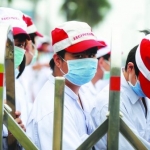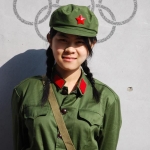
One of the most interesting dimensions of the recent strikes at three Honda auto components factories in the Pearl River Delta region has been workers’ clearly articulated demand for their enterprise unions to be elected by and accountable to workers. Their demands are uncommon, but not unprecedented. Back in 2006, workers at the Ole Wolff electronics factory fought for a workers’ elected union in Yantai. (1) Another distinguishing factor in these disputes was the large wage increases demanded by workers. In most industrial action in the Pearl River Delta region, workers demand little or no more than the minimum wage, or payment of unpaid wages. But striking workers at these Honda plants demanded large wage increases, and what’s more, they also wanted a graduated wage scale, which reflected their aspirations for a career path and job security…

For much of the working class and oppressed communities in India, the Chinese “model” is not its current capitalist market system, but the socialist revolution that preceded it under the leadership of Mao. In both nations the desperation of hundreds of millions in the face of “globalization” is growing, now heightened by the worldwide capitalist crisis. Though each government has shown an ability to buffer some of the worst effects of this collapse, and taken recent measures to ameliorate the burdens on the working classes, in the longer run they will not be able to escape the growing contradictions of world capitalism. Already, in both China and India, protests against ever widening polarization, impoverishment, corruption, land thievery and ecological devastation are growing in number, size and violence. For the Chinese, who had a revolution and then turned back to the capitalist road, it would take a major reversal to once again move toward socialism. India never had a similar revolutionary socialist transformation, but the forces to carry it out are stronger now than ever. The Indian and Chinese working classes and leftist forces today increasingly face parallel conditions under global capitalism led by an imperial United States. Though they have little contact at present, the future may bring a new unity, as the contradictions of the world capitalist system deepen and drive them more closely together.

This article is an overview of the history of the Chinese New Left; their attempt to move away from a left-wing political agenda defined by the CCP; their successes, limitations, and failings in this regard; and the role discourse on the idea of a “Chinese alternative” has played in New Leftist debates with liberals. The article focuses on two prominent intellectuals from the Chinese New Left-Wang Hui and Cui Zhiyuan. It argues that the contradictory role of the Chinese state as both mitigator and patron of market reforms is one of the main obstacles to developing a more radical left-wing political movement in China.

“Peasants vs. Global Capitalism: On ‘The People’s Forum for Food Sovereignty’” - Chinese article about the forum held in Rome in November 2009, by one of the two Chinese participants. One of the first Chinese articles to introduce the concept of “food sovereignty,” relating the struggle of food producers and consumers in other countries to China’s situation.

The Honda workers in Foshan Guangdong could not stand the exploitation and oppression by foreign capital and waged a strike for a number of days in order to increase their wages and improve conditions for union organizing. This struggle demonstrates the heightened rights consciousness of “the new generation of migrant workers” and is a milestone in the history of worker struggles. But their struggle was waged under very difficult conditions.

Several hundred Taiwan scholars have now signed a petition that raises a set of broad demands to respond to the suicides this year at Foxconn:
To Taiwan-funded enterprises including Foxconn/Hon Hai, we ask for an end to military discipline in the factory as well as the dormitory, the improvement of working and living conditions of the workers, and the establishment of a humane production-line process. These are the basic requirements for so-called “corporate social responsibility” that each employer should bear.
…